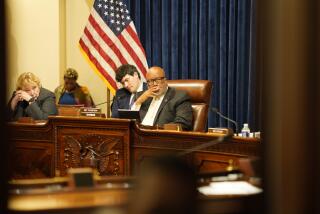Surveillance Issue Unlikely to Delay Christopher Vote : Cabinet: Senate panel aides say his role in Army conduct was sufficently aired in 1977. Helms vows to press matter at hearing.
- Share via
WASHINGTON — The revival of questions about Warren Christopher’s knowledge of U.S. Army surveillance of civilian protest movements in the 1960s is unlikely to delay his confirmation as secretary of state, Senate Foreign Relations Committee aides said Monday.
Sen. Jesse Helms (R-N.C.), a perennial conservative gadfly, plans to question Christopher about the issue during his confirmation hearing on Wednesday, Helms aide James W. Nance said.
“It’s a serious matter,” Nance said. “We’d be remiss if we didn’t ask.”
But he acknowledged that the issue is not likely to block the committee’s vote to send Christopher’s nomination to the Senate floor, scheduled for Jan. 19.
A spokesman for committee Chairman Claiborne Pell (D-R.I.) said that the panel’s Democratic staff believes the issue was investigated sufficiently in 1977, when Christopher was confirmed as deputy secretary of state in the Jimmy Carter Administration.
A spokesman for Christopher said that the Los Angeles lawyer stands by his 1977 testimony that he did not know about improper actions by the Army, but added that he “is prepared to answer any and all questions the committee may address to him.”
At issue is a series of 1968 memoranda to Christopher that the Associated Press found last week in the Lyndon B. Johnson Presidential Library in Texas, some of which refer to Army intelligence activities.
Christopher was deputy attorney general in the Johnson Administration and helped direct the federal government’s response to civil rights marches, anti-Vietnam war protests and urban riots in the late 1960s.
Christopher has acknowledged that he knew that the U.S. Army was collecting information about protest organizations but he said in 1977 that he did not realize the Army program included covert surveillance. “If it had been brought up, I would have been strongly opposed to it,” he said then.
A Clinton transition official who asked not to be named said that Christopher stands by his 1977 statement. “Nothing that he stated in his testimony is inconsistent with his recollection of events that happened 25 years ago,” the official said.
One of the documents discovered by the AP includes a reference to Army “operatives” in Washington, D.C., but it does not say what the operatives were doing.
The July 23, 1968, memorandum describes the potential for civil disturbances and notes that the main source of information in the city was the Army’s 116th Military Intelligence Group. “The 116th relies upon local police departments for some of their information, but also have their own operatives in the area,” the memorandum said.
Pell spokesman Frank A. Sieverts said that the reference to the Army’s “operatives” was inconclusive. “At no point do those memos say that this is the result of illegal surveillance,” he said.
The Army’s domestic intelligence effort was launched after troops were sent to quell a 1967 riot in Detroit and officers complained that they had inadequate information. The program quickly grew to include infiltration and covert surveillance of anti-war and civil rights groups.
A Senate investigation reported in 1976 that the Johnson Administration, especially then-Atty. Gen. Ramsey Clark, had demanded extensive domestic intelligence from the Army but then failed to exert much restraint over the tactics the Army used to meet the demand. Christopher was Clark’s second-in-command at the time.
More to Read
Get the L.A. Times Politics newsletter
Deeply reported insights into legislation, politics and policy from Sacramento, Washington and beyond. In your inbox twice per week.
You may occasionally receive promotional content from the Los Angeles Times.











